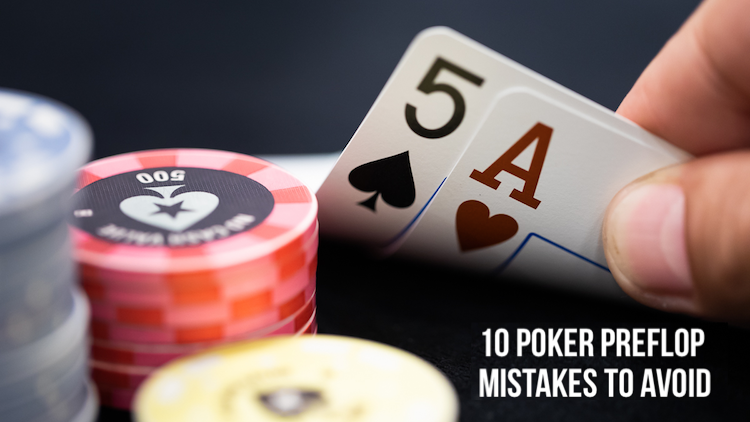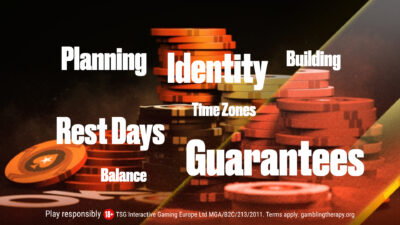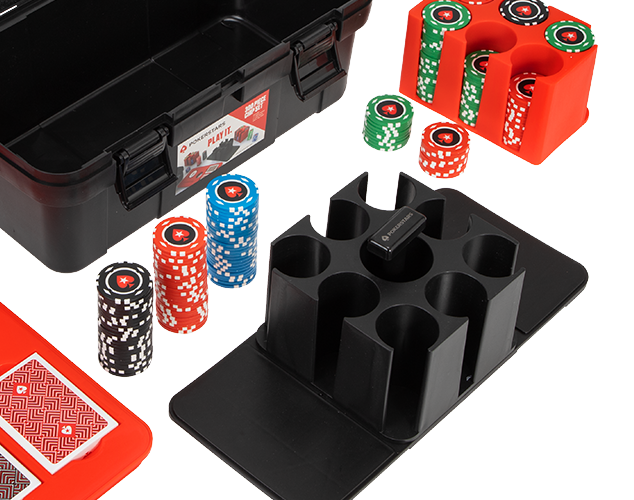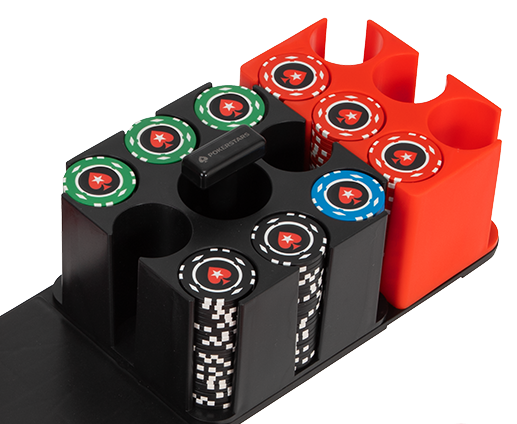Preflop strategy is often a kind of logical starting point for those learning how to win at no-limit Texas hold’em.
It makes sense that new players want to focus on the very first action they take in a hand. It starts with the decision whether or not even to play the hand, which on the surface might seem like a simple, easy-to-understand place to begin.
But more experienced players know that decision is hardly simple. There are many factors that need to be considered before getting involved and putting any of your chips at risk in an effort to win more.
Here are 10 common preflop mistakes that many poker players make, especially new ones. All are avoidable, but you need to realize you’re making them before you can eliminate them from your game.
1. Playing too passively
Playing passively means doing a lot of calling, and rarely if ever betting out or raising. You are letting other players drive the action with their bets, only calling if you have something you think might be good at showdown.
One sign of a passive preflop player is a lot of open limping — that is, just calling the blind rather than raising. Doing that a lot is kind of a strong “tell” that the player is a novice or at least doesn’t really know a lot about preflop strategy.
In a way, being too passive is a little like playing poker as though it were blackjack. It’s like you are saying “hit me” all the time. And if you keep doing that, you’re going to get knocked around pretty good.
You need to “hit” out at others, too, sometimes. Before the flop, enter the pot with opening raises and force your opponents to make decisions. Don’t always be reacting to others, but act first yourself.
2. Playing too aggressively
New players sometimes don’t even realize how all those bets and raises they are making are viewed as “aggressive” play by others. An aggressive style can be effective, although when it comes to preflop play, it is easy to overdo it.
The biggest problem with being too aggressive preflop is that by betting big or raising (or reraising), you are often making pots bigger than average. That raises the stakes (literally!) when it comes to postflop decisions.
If you have a strong preflop hand (aces, kings, queens, ace-king), you may be very comfortable making big pots early in the hand. But if you have a medium-strength hand (king-queen, jack-ten, eights, sevens), you might find life difficult after the flop when you’re suddenly facing a decision for your entire stack with what might well be a second-best hand.
3. Playing too many hands (too loose)
Playing too many hands isn’t the same as playing too aggressively. You can play a lot of hands, but do so passively (by calling a lot instead of raising). When you play a lot of hands, you are playing a loose style. And if you want to play a loose style preflop, you better be ready to deal with a wide variety of decisions post flop.
Truth be told, many successful players play a tighter style that involves being more selective about playing hands than loose players who play a very wide range. In tournaments especially, players might only play 10-15 percent of poker hands (in full ring games).
For a couple of reasons, new players especially are better off trying to play tight rather than loose. For one, it helps them avoid too many tough spots after the flop. It also ensures when they do play hands they are more often than not doing so with strong hands.
4. Playing too few hands (too tight)
While it is great to practice smart starting hand selection, you can’t be too selective and only play aces and kings. For a number of reasons, you need to open up your range of hands and play some less-than-monster starters now and then.
For one, you can’t afford to sit around and wait for aces. In a tournament, for instance, you’ll eventually lose a lot of your stack just from paying blinds and antes. Then when you do get aces, you can’t win as much with them, anyway, because you have become short-stacked.
Also, if you play too few hands your opponents will know that whenever you do get involved, you have a very strong starting hand. That in itself is a disadvantage, almost like playing with your cards face up. Opponents know to fold if they aren’t strong themselves. They also know if they do manage to make a stronger hand (like two pair or a straight), they might get all of your stack as you call their all-in bets with your pocket aces.
5. Not recognizing the importance of position
Positional advantage is a fundamental element of winning poker strategy. In no-limit hold’em, every player knows before the flop whether he or she is playing from late position (the hijack, the cutoff, the button), early position (the small blind, the big blind, under the gun) or middle position (the seats in between).
A player’s relative position depends on how the preflop betting goes, but more often than not those in late position preflop will be playing with position on their opponents after the flop. Having position is a huge advantage, and should have a lot of influence on your decision whether or not to play a given hand.
Ace-five might be fine to play when opening from the cutoff or the button, but if you are dealt it under the gun you probably are going to want to fold. Understanding how position impacts poker strategy can be a huge edge, starting with how you play preflop.
6. Not recognizing the importance of stack sizes
Stack sizes have significance whether it is a cash game or a tournament. In a tournament they tend to have special importance, since losing all your chips means losing a seat at the poker table.
When deciding whether or not to open with a raise, think about what percentage of your stack you are committing preflop, and how that will affect your decisions after the flop. Pay attention as well to your opponents’ stack sizes and whether or not they might become “pot committed” earlier than later in a hand, depending on how preflop goes.
People focus a lot on the cards, especially before the flop. But a lot of times a poker hand is more particularly influenced by the stack sizes. In tournaments especially, become familiar with different preflop strategies for short, medium, and deep stacks.
7. Calling too many opening raises from the blinds
Calling raises before the flop isn’t always bad. From late position with a good drawing hand, a pocket pair, or some other hand of medium strength, it is often going to be a smart play to flat call a raise and enjoy playing from position after the flop.
But when you call too many preflop raises from the blinds, you are setting yourself up for failure. Being out of position postflop makes it hard to play draws or stick around with a pair of eights when the board brings lots of cards nine and above.
Don’t always feel obligated to defend your blinds with lots of calls.
8. Calling too few opening raises from the blinds
On the other hand, if you always fold from the blinds when others raise, you are likewise making a mistake.
Here we might differentiate between the small and big blind. Fold to raises more often from the small blind, as the cost is greater to call and you may well find yourself up against multiple opponents and playing from out of position.
Calling from the big blind often means setting up a heads-up situation with the preflop raiser, which is relatively more manageable than playing against multiple opponents. The price to call is less, too, since you’ve already committed the big blind.
Don’t call with bottom-of-the-barrel trash hands, but do consider calling sometimes with decent starters that have some potential. Make note of your opponent, too, and the style he or she is playing. Against loose players, you might call more often than you would against tight ones.
In any case, realize you have to “stand up for yourself” now and then and defend your blind with a call. Otherwise, your opponents will gladly keep stealing your blinds over and over again.
9. Raising too often (or not enough) from the button
Here’s another one of those two-sides-of-the-same-coin strategy tips designed to keep you from being too extreme in either direction. We’re combining this one into a single mistake — playing incorrectly from the button when action folds to you.
Some players think that every time it folds to them on the button, they have to raise. Time to steal those blinds and antes, right? Well, if you do anything all the time, others will start exploiting you. A player in the blinds who knows you always open-raise will start reraising big with any two cards, knowing that you’ll likely have to fold with what is often a so-so hand.
By the same token, don’t forget to make that opening raise from late position from time to time, even if you don’t have a strong starter.
As noted above, you have to make a conscious effort to play more hands when you have position on your opponents. And as also noted above, you have to raise sometimes even without the strongest starting hands, in order to keep your opponent from knowing what you have when you open a pot.
10. Finding excuses to play hands that you shouldn’t
A lot of times it seems harmless to call a small bet to see a flop, even with a poor starting hand. This happens a lot to players in the big blind. Someone raises, two others call, and you look down at some middling stuff like 9♦ 6♣ and manage to talk yourself into calling.
Sure, you’re only paying a little more there, but then you find yourself somewhere after the flop calling more bets with a medium-strength hand or draw. That tiny price you paid preflop can become very expensive later in the hand — about when you think to yourself, why am I playing nine-six offsuit from out of position against multiple opponents?
Folding is less exciting than playing. But you have to learn a little preflop discipline and let go of trash hands in spots if you want to avoid allowing small mistakes to become big ones.
Back to Top











